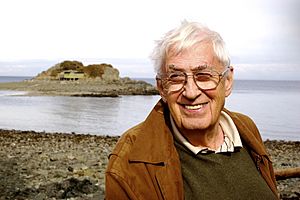C. S. Holling facts for kids
Quick facts for kids
C. S. Holling
|
|
|---|---|
 |
|
| Born | December 6, 1930 Theresa, New York, U.S.
|
| Died | August 16, 2019 (aged 88) Nanaimo, British Columbia, Canada
|
| Nationality | Canadian |
| Alma mater | |
| Known for | Co-founder of ecological economics |
| Awards |
|
| Scientific career | |
| Fields | Ecology |
| Institutions | University of Florida |
| Thesis | The components of predation as revealed by a study of predation by small mammals of Neodiprion sertifer (Geoff.) (1957) |
| Doctoral advisor | Ian McTaggart-Cowan |
| Doctoral students |
|
Crawford Stanley "Buzz" Holling, OC FRSC (born December 6, 1930 – died August 16, 2019) was a famous Canadian scientist. He was an ecologist, which means he studied how living things interact with each other and their environment. He was a professor at the University of Florida. Holling also helped start a new field called ecological economics, which connects nature and the economy.
About Buzz Holling
Buzz Holling was born in the United States in 1930. His parents were Canadian. He grew up in Northern Ontario, Canada. This is where he first became very interested in nature. As a teenager, he was part of a group called the Toronto Junior Field Naturalists. This group was at the Royal Ontario Museum and helped young people learn about the natural world.
He went to the University of Toronto and then the University of British Columbia for his university studies. After finishing school, he worked for the Canadian Department of Forestry.
Later, Buzz Holling held many important positions. He was a professor and director at the University of British Columbia. He also led the International Institute for Applied Systems Analysis in Vienna. He then became a special professor at the University of Florida.
He retired from the University of Florida in 1999. However, he continued to be involved as an Emeritus Eminent Scholar.
Holling received many important awards for his work. The Ecological Society of America gave him two major awards. He won the Mercer Award in 1966 for an outstanding paper in ecology. In 1999, he received the Eminent Ecologist Award for his great contributions to the science of ecology. He also won the Volvo Environment Prize in 2008. In 2009, he was made an Officer of the Order of Canada. This is a high honor given to Canadians who have made a big difference. He received it for his new ideas in ecology, especially about how ecosystems change and recover.
He helped start an online science journal called Conservation Ecology. It is now known as Ecology and Society. He also created the Resilience Alliance, which is a group of scientists from around the world.
What Buzz Holling Studied
Throughout his career, Buzz Holling combined different ideas to understand how nature changes. He used systems theory, which looks at how different parts of a system work together. He also used ecology and computer models to study nature. His goal was to create ideas that could help solve real-world problems.
He introduced several important ideas that are still used today. These include:
- Resilience: This is about how well an ecosystem can handle changes and bounce back.
- Adaptive management: This is a way to manage natural resources by learning from what works and what doesn't.
- The adaptive cycle: This describes how ecosystems go through periods of growth, breakdown, and renewal.
- Panarchy: This idea looks at how different systems, like natural and human systems, are connected across different scales.
His early work focused on how animals hunt and eat other animals. He studied how many prey an animal eats based on how many prey are available. This idea is called the functional response. It is still a very important part of understanding animal populations today.
In 1973, he wrote a very important paper about the resilience of ecological systems. This paper had a big impact on how scientists think about nature. His ideas have been very helpful in managing ecosystems. This includes his work on Adaptive management and the Adaptive Cycle.
More recently, he studied how ecosystems are structured and change at different sizes, from small areas to large regions. This work led to a book in 2002 called Panarchy: understanding transformations in human and natural systems.
His work is often mentioned by scientists who study ecology, environmental management, ecological economics, and how humans affect global change.

